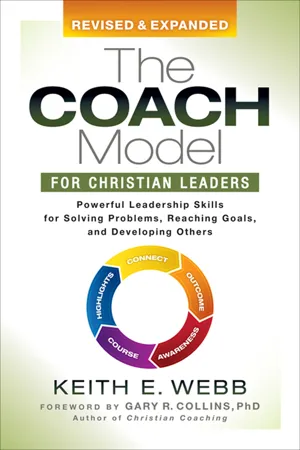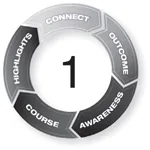![]()
Coaching Mindsets
“But the Counselor, the Holy Spirit, whom the Father will send in my name, will teach you all things and will remind you of everything I have said to you.”
—John 14:26
I have a serious illness. It afflicts many without regard to education, economics, or ethnicity. PhDs as well as factory workers suffer from it. It evenly attacks those everywhere—Africa, Asia, Europe, Middle East, and North & South America. People of faith are not immune. In fact, they may have a slightly higher rate of infection, but not by much. Sometimes those with no faith at all can exhibit the strongest symptoms of the illness. There are those who say the illness doesn’t exist—or if it does, it only exists in others.
It’s called know-it-all-ism.
Know-it-all-ism affects the ability of the mind to take in information and process it without prejudice. The illness causes blindness to opinions, answers, and solutions other than their own.
There are two strains of this infection: aggressive and passive. Both strains cause the infected person to believe their ideas are better than others’ and that they are correct. The difference between the strains of infection is in how this belief is expressed.
The symptoms of aggressive know-it-all-ism are:
- •Quick to speak
- •Listens until the other person takes a breath
- •Has an answer for everything
- •Wins arguments, but loses respect
The symptoms of passive know-it-all-ism are:
- •An appearance of listening
- •Maintains a smug facial expression
- •Asks questions that subtly point out why the speaker is wrong
- •Internally mocks or criticizes the speaker
Do these descriptions bring a couple of people to mind? People afflicted with know-it-all-ism are all around us. However, the ability to spot know-it-all-ism in others may be a sign that you yourself suffer from this illness. As you continue, try to read for your own benefit rather than for the purpose of fixing others.
Know-It-All-Ism Diagnosed
My first big leadership role began when the organization I worked with in Japan at the time appointed me as the Director of Church Multiplication. I was 28 years old and more than ready to go. I supervised seven American families that were tasked with planting new churches. Due to my illness of know-it-all-ism, my communication style relied heavily on advising. I regularly handed out advice in the form of ideas, suggestions, hints, speeches, teaching, and even prayer requests.
As I offered strategies regarding the ministries of the other families, I quickly discovered that my suggestions and help were not always welcomed or appreciated. Like me, they had their own ideas. I was taken aside and talked to several times over those first few years about “pushing my agenda,” “running over the feelings of others,” and not listening. “We have ideas too,” they informed me.
It wasn’t just that I was afflicted with know-it-all-ism, as a supervisor I also felt responsible for my teammates. I thought if I knew something would be helpful, it was my duty to tell them. To not say something would be irresponsible.
I was puzzled that my efforts to help were perceived as arrogant or dictatorial, and I was frustrated that even after I realized this was happening, I didn’t have other communication tools with which to help our group accomplish its goals.
“To improve is to change; to be perfect is to change often.”
—Winston Churchill
Changes in My Thinking
Three things happened that changed not only my communication skills, but also how I thought about leading other people.
First of all, I heard about a set of non-directive communication skills called coaching that help people find solutions and grow. Coaching involves listening to others, asking questions to deepen thinking, allowing others to find their own solutions, and doing it all in a way that makes people feel empowered and responsible enough to take action.
The problem was I was terrible at listening and asking questions. I already knew what people should do, or so I thought. Why did I need to ask them questions about things when I already knew the answer?
“Why do I need to ask questions when I already know the answer?”
I was convinced that coaching skills were the key to getting people to accept my ideas and solutions, so I was motivated to learn. However, it didn’t feel genuine. I found that bringing others around to my conclusions by using questions was much more difficult than I imagined. (Obviously, I didn’t understand coaching.) Some of those I worked with may have felt manipulated, and rightly so. I quickly went back to telling people what I thought they should do. But being a good learner, I renamed my old practice “coaching.”1
The Holy Spirit
The second thing that helped me change my way of thinking happened when I read a verse in the Gospel of John in which Jesus says this to his disciples,
“But the Counselor, the Holy Spirit, whom the Father will send in my name, will teach you all things and will remind you of everything I have said to you” (14:26).
I was struck by the promise that the Holy Spirit will teach remind. I thought my job as a leader was to teach and remind. Authority figures in my life had taught and reminded me—parents, teachers, mentors, and supervisors. My church had taught me to teach the truth and to confront error wherever I encountered it.
What did it mean to take Jesus’ instruction literally? How can I, as a leader who is responsible for others, not teach or remind?
A short time later, while finishing my master’s degree, I took a class with C. Peter Wagner. The class was about church multiplication, and one day Dr. Wagner told the class about the tremendous growth of African independent churches throughout central Africa during the 1980s. He showed graphs that illustrated the dramatic increase in church attendance during that period. Some of the largest churches in the world at that time were to be found in central Africa and were led by African leaders. These churches were not a part of a foreign denomination. Instead they were indigenous.
Someone in the back of the room raised his hand, stood up, and with an emotion-filled voice said, “But Dr. Wagner, some of these churches are largely heretical! Some of those African pastors are corrupt and extremely authoritarian. Their theology is a mix of animistic practices and Christianity. One of the largest of these independent churches doesn’t even believe in the deity of Jesus. How can you hold them up as an example of church growth?”
Dr. Wagner smiled and gave a little chuckle, then, stroking his pointy white goatee, he explained that it wasn’t until 325 A.D. that the Council of Nicaea agreed on the deity of Jesus, and another 75 years before they could describe the Trinity. It wasn’t until the Synod of Hippo in 393 A.D. that the Canon of Scripture as we have it now was settled.
“So,” he concluded, “if we can give the Holy Spirit a couple hundred years to work those things out with the early Church leaders, I think we can give Him a couple decades to work out any issues with our African brothers and sisters.”
Wow. I was shocked. I bristled and thought this was one of the most irresponsible statements I had ever heard. After all, as ministers, what is our job if it isn’t to make sure the Bible is taught and applied correctly? We have the Scriptures, our final authority of faith and action, and if a fellow believer is clearly believing or behaving in non-Biblical ways, shouldn’t we confront them with their error? I realized my high view of Scripture was not wrong, but my understanding and reliance on the Holy Spirit was weak.
I also felt convicted. If I was honest, I had to admit I didn’t trust the Holy Spirit, and the Holy Spirit alone, to correct any problems in the African church. I incorrectly thought that God needed my help or the help of other Christians. This is surely the height of ministry arrogance. Dr. Wagner, on the other hand, trusted the Holy Spirit to do whatever God wanted without assistance from himself, seminary students, or the American church.
I learned two things about leadership responsibility:
- 1.It is not my responsibility to change others. The Holy Spirit can and will do it on His own—maybe with me but often without me.
- 2.It is not my responsibility to correct everything that I think is out of sync with Scripture, company policy, or best practices. The Spirit may choose to use me in this regard, or He may have other means or different timing in mind.
To someone afflicted with know-it-all-ism these realizations are nothing short of revolutionary. The pressure I felt to change people decreased, while my reliance on the Holy Spirit to make necessary changes increased. I continued to do my part by speaking up when appropriate, but with an attitude of looking for and joining God in His ongoing work.
The Cost of Advice
The final lesson that solidified my change of mindset happened after my family moved to Indonesia, the largest Muslim country in the world. Once there, I worked with indigenous Christian organizations serving in remote people groups of Indonesia. These groups were Muslim. As you can imagine, the radicals in these areas did not value a free-flow of ideas regarding belief in Jesus, instead they sought to keep out anything they viewed as competing with Islamic dominance. During my years in Indonesia, radicals detonated bombs in Bali and Jakarta, attacked Christian churches, and constantly threatened foreigners.
Against this backdrop, I began working with young Indonesian Christians who were eager to help alleviate poverty, teach children the national language, and to share the good news about Isa al Masih (Jesus the Messiah) with their countrymen. Most of these Indonesian believers were 18- to 21-year-olds with just a high school education and three months of Bible training.
They were eager to learn from me. They appreciated my ideas and wanted more. Even better, I found that they would go and do what I advised them to do. I thought, “Ah, finally someone who will listen to me!” I felt validated, important, and appreciated.
Even though, in my mind at least, I was careful to allow my Indonesian friends to make their own decisions, I gave them a lot of advice. They would go and implement a plan based on my recommendations and then come back to ask for the next steps. I would tell them that they needed to figure it out on their own, but somehow (without too much difficulty) they would get me to give them my advice on their situation. Then they would go do as I had advised.
Here’s where my next insight came from. I found that younger Americans, Australians or Europeans, being from egalitarian societies, would listen to me and take whatever part of my advice they found helpful and disc...

